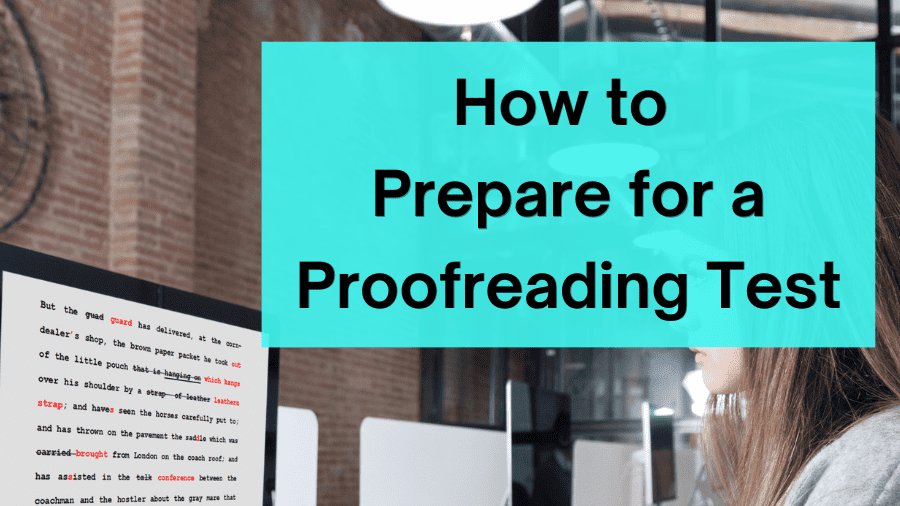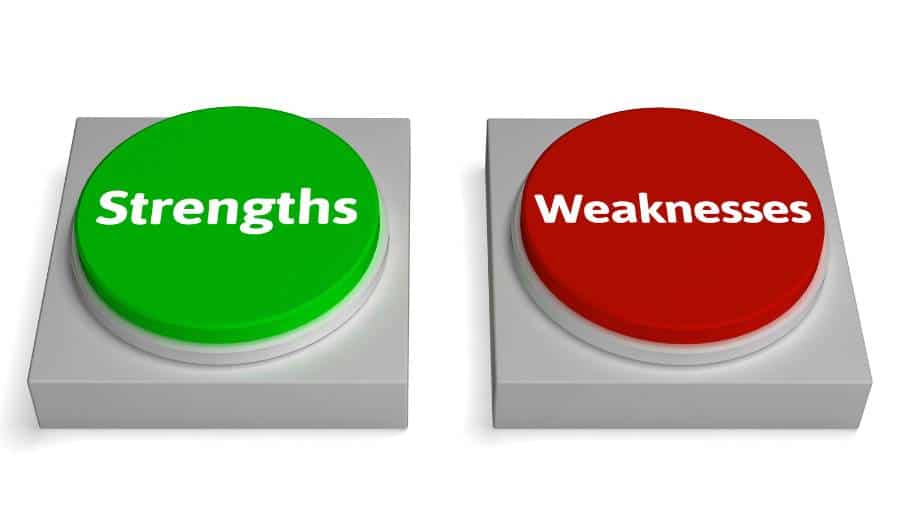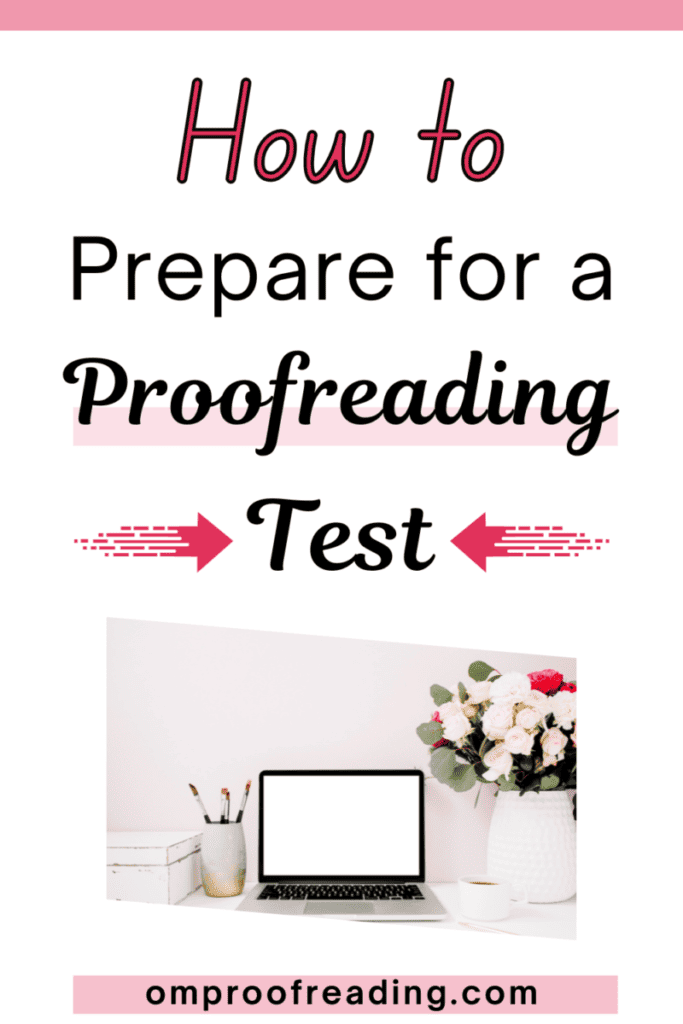This article may contain affiliate links. Please see our affiliate disclaimer in the footer menu for more information. Thank you for your support!

How you prepare for a proofreading test depends on the type of exam you’ll be taking. For example, you may be taking an assessment to secure a position as an administrative assistant, to earn a certificate for a proofreading class you’ve completed, or to become a proofreader at a company.
No matter what type of test you plan to take, these tips will provide you with everything you need to know to be ready to ace the assessment!
1) Know the details to prepare for a proofreading test.
One of the best ways to get ready is to know the particulars beforehand. If you’re unsure what the test entails and can ask someone questions, do it! 😊
When I was preparing for the final evaluation in the proofreading course I took, I asked a few general questions so that I was as prepared as possible.
I had to use The Chicago Manual of Style (CMOS) to proofread a document for my assessment.
Since some rules in CMOS have an alternative, I asked a clarifying question regarding a CMOS guideline.
I may have been overly concerned with something specific, but it made me feel better to ask.
The more you know about the test, the more comfortable you’ll feel.
Try to nail down the following details about the exam:

- Is it timed?
- What’s the format? (proofread a document, multiple choice, fill in the blank, etc.)
- Do I need any software?
- Do I have to follow a style manual or a house style?
- In what English dialect—US, UK, Canadian, or Australian—should I proofread?
- Does it focus on anything in particular?
- Am I required to know any of the following:
- proofreading symbols (unlikely)
- how to format citations
- industry-specific terminology
- What resources can I use during the exam?
You may be taking a test that doesn’t allow aid from certain sources.
However, most proofreading exams let you use anything that could assist you with identifying and correcting errors (e.g., spellcheckers, grammar checkers, Grammarly, PerfectIt).
But remember that software isn’t foolproof, so you’ll need to carefully evaluate any suggestions it makes.
2) Develop a study plan you can stick to.
Your exam may be tomorrow, or it may be two months from now.
Consider the time you have to prep, and figure out when you can fit study sessions into your schedule.
Remember that consistency is key, even if you only have a small chunk of time daily.
You may want to write down the time and duration of your study sessions if that would help you stick to them.
And planning what you’ll learn or review during each session will ensure you can study all the topics you need to.
3) Brush up on weak areas.

You may be well aware of your weak areas, or you may need help identifying them. You can do this by taking online assessments.
If you want to assess your grammar know-how, I recommend the grammar practice test on GrammarBook.com.
After you’ve worked on your weak points, you can take GrammarBook.com’s grammar mastery test to reassess your skills. The mastery test is on the same page as the practice test; the above link will take you there.
Also on that page are practice and mastery tests for punctuation.
4) Use reference books and online resources to study.
Fortunately, the internet is full of resources you can take advantage of.
For example, my article about sites that help you practice grammar will give you several suitable options for reviewing and practicing grammar rules.
I also have articles with practical tips for boosting your grammar game and pumping up your punctuation proficiency if you think that would help the most.
Finally, I have an article containing brief descriptions of my favorite proofreading reference books if that suits your fancy.
5) Become familiar with the indicated style guide (if needed).

Some proofreading evaluations require you to proofread according to a style guide. If this is the case for you, be sure to know the guide well.
Most importantly, you need to know how to efficiently navigate it to find answers.
6) Practice proofreading to hone your skills.
If you’re already a proofreader, you probably tend to proofread everything you see—at least to some degree. It’s a natural reflex! 😉
You’re always searching for spelling stumbles, grammar goofs, and punctuation problems.
No matter if you’re a proofreader, you’ll want to practice proofreading prior to your exam.
In addition to practicing with books, magazines, and newspapers, you may want to try spotting slipups in the following:
- comments on YouTube videos
- social media posts
- Amazon reviews
- restaurant menus
- billboards
- flyers
- blog posts
- instruction manuals
These sources should be enough to help you sharpen your eagle eyes!
7) Take proofreading tests to help you get ready.
Another practical way to prepare is to take proofreading tests and quizzes.
The more practice assessments you take, the more confident you’ll be. If you know your evaluation is timed, try to impose a reasonable time limit on yourself for finishing each practice assessment.
Unfortunately, most practice exams you find online aren’t timed, so you’ll want to establish a time limit for yourself.
8) Develop a checklist tailored to the exam.
Checklists can be a useful proofreading tool. If you can use one during your test (you probably can), try to create one.
Even if you never use it, it will help you remember the mistakes you need to look for.
If you tend to forget to check for a particular type of mistake, put that at the top of your list.
When creating your checklist, you can be as general or as specific as you want.
A general checklist would remind you to look for mistakes with errors and inconsistencies with these elements:
- grammar
- punctuation
- capitalization
- spelling
- formatting
- missing or repeated words
- word usage
- adherence to a style guide
If you’d like more specific suggestions, you can check out this post on Om Proofreading.
9) Get good sleep in the days leading up to your test.
Being well rested for any test is a plus—especially a proofreading test.
Getting good sleep during the period before the assessment will help you remember the info from your study sessions.
And you’ll want to score as many z’s as possible the night before the exam so you can enjoy enhanced concentration and relaxation the next day.
10) Have a positive mindset to set yourself up for success.

We know that a positive mindset helps us achieve desirable outcomes.
Make it a point to foster a positive attitude that stays with you, even if challenging moments arise during the assessment.
11) Make your test-taking space as comfortable as possible.
Hopefully, you’ll have control over where you take your exam. If so, you’ll want a quiet spot where you won’t be bothered. If that’s not possible, noise-canceling headphones can go a long way in creating a more peaceful environment.
Before you begin the evaluation, ensure that everything is dialed in: you have a stable internet connection, adequate light, a reasonably comfortable chair, a glass of water, and any necessary resources.
Setting the temperature slightly cooler than usual can help with alertness.
You know what you need, so leave time to set up your space before you start correcting errors like a boss!
12) Read the directions twice.
With construction work, they say to measure twice and cut once. With proofreading tests, read the directions twice and take the test once.
They may give you guidelines as part of the evaluation.
To illustrate, an essential part of any proofreading job involves tailoring it to your client, which could be an individual or a business. You may need to follow a specific style guide, house style, or other instructions.
Your ability to accommodate clients’ preferences is part of the job.
The instructions may require you to use a specific software, download a file and give it a particular name, or leave all instances of a certain word or phrase as is.
Bottom Line: Make sure you proofread following the specifications they give you.
13) Use effective proofreading strategies.
You’re likely aware of some proofreading tactics, while others have yet to be added to your toolbelt.

For example, reading what you’re proofreading out loud and listening to your computer read it to you using the text-to-speech function are two solid strategies.
Learn some other helpful hacks before you sit for your exam.
My article about proofreading tips should help round out your knowledge.
14) Take your time if there’s no limit.
I recommend taking your sweet time if there are no limitations. Once you’ve finished the test, return to it several hours later (ideally the next day), and go over it again.
You probably know that leaving a piece of writing and coming back to it later is one of the best ways to find errors you overlooked.
Furthermore, if your exam involves proofreading a document, you’ll want to perform several passes. Each time you read through the text to check for mistakes is one pass.
Some people find it helpful to focus on finding one type of error per pass.
For example, you may want to perform one pass for grammatical errors only.
15) Manage your time well if it’s limited.
Some proofreading exams are timed since proofreaders sometimes have to meet tight deadlines. For timed tests, I’d encourage you to use the age-old strategy of not spending too much time in any one question.
Your evaluation may be multiple choice, or you may be required to proofread one or more documents. No matter the format, you can apply this technique.
For example, if you’re responsible for proofreading a text, don’t spend too much time finding mistakes in any given section.
Likewise, don’t dedicate too much time to figuring out how to fix any one error.
No one is perfect, so move on to what you know instead of spending time on an area of uncertainty.
I hope this article has provided all the practical tips you need to prepare for a proofreading test.
I wish you luck with your assessment and will be cheering you on in spirit!
Best wishes to you!
“Do what you can, with what you have, where you are.”
– Theodore Roosevelt

Recent Posts
Punctuation is important because it enables us to communicate our message clearly and effectively. Without punctuation, we wouldn’t understand how units of a sentence relate to one another or how...
Although you're probably somewhat familiar with adverbs, you may be unaware of sentence adverbs. As a trained proofreader who has studied the parts of speech, I can help you understand this unique...
